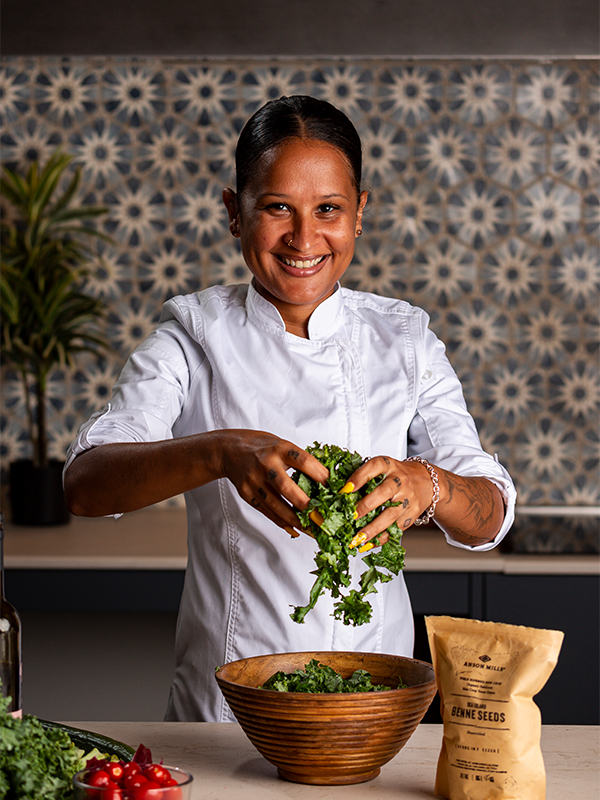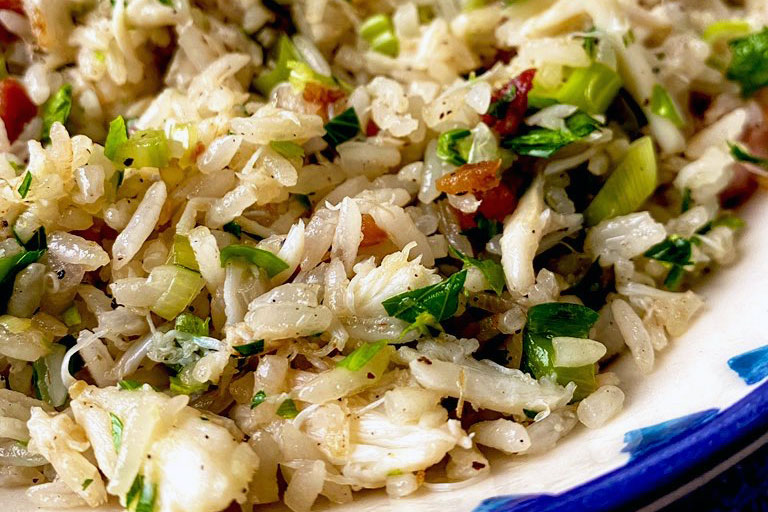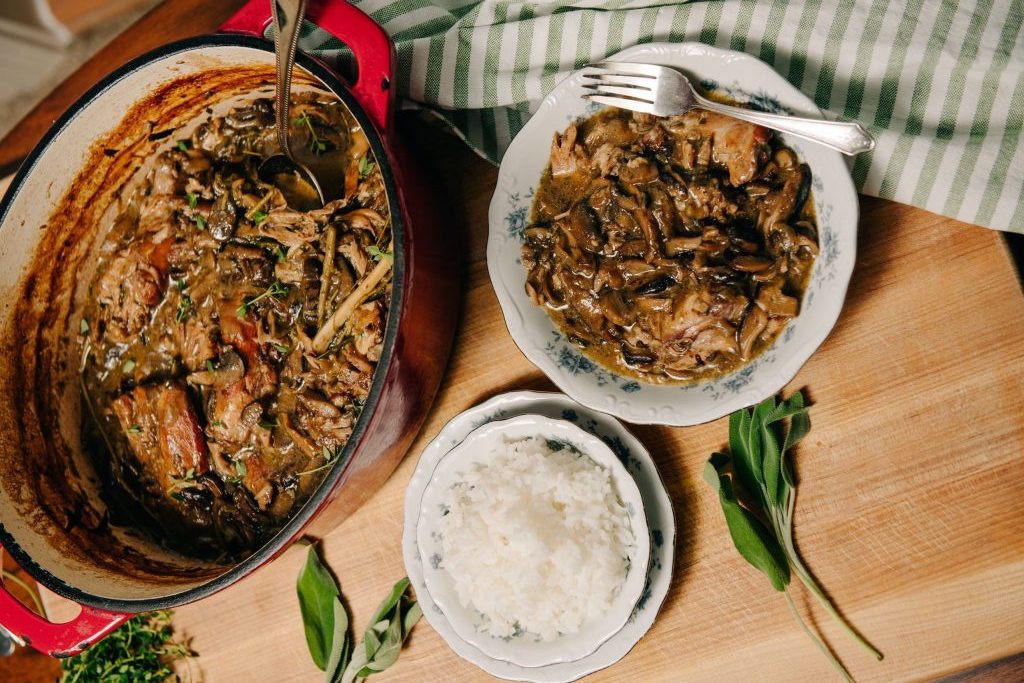In South Carolina’s Lowcountry, rising culinary star Amethyst Ganaway grew up amongst hunters, fishers and farmers. She roasted venison, figured out every way possible to break down a sweet blue crab, and spent hours on the porch with her elders snapping peas.
This foundational expertise in Black Southern food became her passion. Ever since, her career has been about highlighting the sustainable, culturally rich and unbelievably flavorful nature of African Diasporic foodways.
In a reality where a multitude of stigmas centered on Black food, particularly Black Southern food, persist—most recently, it’s been referred to as unhealthy or “low-vibration”—Ganaway is here to educate and enlighten.
“I want people to see that the South is not some desolate, dying place for Black people,” Ganaway tells Sweet July. “I want people to know that the dish their granny made has a deeper history, a deeper meaning. I don’t want people to feel embarrassed by our foodways or limited because of what they’ve been told or what they see.”
Her recipes all have an air of luxury about them: silky crab rice, complexly flavored rabbit stew, curried fonio, pickled spiced shrimp. But they are, at their core, about how simple living and simple cooking is the greatest indulgence of all, especially in a world that tries to take away these food traditions. Ganaway, who’s proud to be part of the culinary world’s future, is also proud to say it’s heavily informed by the past, which she sees every day in South Carolina.
After working in New York, Georgia, and New Mexico kitchens, Ganaway returned back to her hometown of Charleston about a year and a half ago, and felt the siren call to dig even deeper into her roots.
The accomplished food writer was already using her pen to delve into the 500-year history of Black people using food as resistance and the sacred art of Lowcountry red rice and its African Diasporic mirrors. Her work traces the paths our food took when we were taken from West Africa and brought to places from the Carolinas to the Caribbean. She’s now furthering this work as the head recipe developer for Yolélé, Chef Pierre Thiam’s West African food brand.
While Ganaway’s work stretches across the entire Diaspora, she always pays homage to the South, her birthplace and home. Ganaway’s grandmother was active in the Black resistance movements of the ’60s and ’70s and was a member of the Nation of Islam. Ganaway embraces that history through food.
For inspiration, she pores over vintage Lowcountry cookbooks found in used bookstores, Etsy and databases—by Black and white authors. What she finds there tells an interesting story about power: essentially, who gets to tell the story of Southern food.
“Some of the first Southern cookbooks were written by white women who might give acknowledgment to the Black women that cooked for them at home… their ‘mammies,’” says Ganaway. “But Black people weren’t allowed to be authorities on our own food. Our food was never heralded in those spaces unless there was a white face and name behind it.”
In addition to her grandmother, the Black women activists, authors and chefs Ganaway admires range greatly, from Vertamae Smart-Grosvenor, author of Vibration Cooking: or, The Travel Notes of a Geechee Girl, to Edna Lewis, the renowned granddaughter of enslaved people who transformed the way Americans looked at Black Southern cooking.
Ganaway points out that we sometimes don’t recognize these extraordinary Black women as the culinary geniuses they are until they become elders or until they pass. Although she says Charleston’s food scene is still “a good ole boy system,” where descendants of slave-owners with bridges named after them have an obvious leg up, she sees certain changes on the horizon and some that are already present.
“There’s been a recent racial reckoning,” she adds. “Food publications are bringing in more Black women voices. But it’s not enough.”
In summer 2022, Ganaway had a mini-stroke, or a transient ischemic attack (TIA). “Since the stroke, I’ve been having a lot of dysphasia,” says Ganaway. “Basically, my brain will see something, but I can’t place a word for it, which obviously is very difficult as a writer. The other day, I almost broke down crying because I couldn’t remember Nikki from The Parkers.”
In the aftermath, she became frustrated by people—those who believe the misconception that Black Southern cuisine is unhealthy—suggesting her condition could be tied to her diet.
Just like advocating for her community often is, self-advocacy can be tiring, but it’s something Ganaway has learned to do from a young age. Ganaway’s mother never had custody of her—she was “legally an orphan/ward of the state [her] entire life”—and the relationship between them remains estranged. Ganaway’s grandmother—who also taught her to cook—one day presented her with a copy of Khalil Gibran’s The Prophet, where in his prose poem “On Children,” the Lebanese poet writes to parents, “You are the bows from which your children as living arrows are sent forth.”
Ganaway says that she still carries that message from an individual standpoint, but also from a community point of view. “[Others] shape you, they don’t define you,” she says.
With that top of mind, Ganaway’s work will continue to recognize the beauty in the connections and differences across African Diasporic foods.
“Our cultures thrive here,” says Ganaway. “I said cultures not culture, because we’re not a monolith. Black people don’t sound the same. They don’t eat the same. South Carolina’s even got seven different regions that are all completely different in their foodways. So, I want people to be able to recognize themselves in my work—in what I do and what I cook. And I want to do it unapologetically, without changing myself. I want to see myself, too.”









